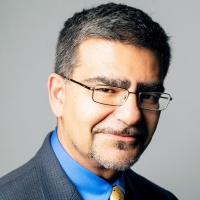Guest post by Dr. Babak D. Beheshti, New York Institute of Technology
This Success Story is a report on the results of the Northeast Big Data Innovation Hub’s 2020 Seed Fund program.
The objective of this project was to expand data literacy and broaden the participation of underrepresented minorities and women in disciplines and ultimately careers in which an understanding of data science is foundational.
The development and delivery of the asynchronous Introduction to Data Science course had two main goals. The first was to increase data science capacity and talent by creating a sustainable pipeline from high schools and community colleges to universities, focusing on students interested in computer science and data science. Second, our aim was to increase the accessibility of data science in the broader community.
The project’s ultimate goal was to make this course accessible to high school and community college students, as well as to the general public, by converting it to a fully asynchronous online mode. The project leveraged partnerships with local high schools and community colleges to advertise and, through a competitive vetting process, provide scholarships for a group of students to take this course free of charge. This allowed students from lower-income communities and students underrepresented in data science fields to have access to these educational resources.
The project earned tremendous appreciation from the course participants from across Long Island in New York State. Participants included 14 high school students (10 women and 4 men), 3 students from community colleges (men), and 8 students from New York Institute of Technology (NYIT) (3 women and 5 men).
Participants came to the program from the following high schools*:
• Hempstead High School – Nassau County (1,739 students; Minority enrollment: 98%; economically disadvantaged: 72%)
• Elmont High School – Nassau County (1,575 students; Minority enrollment: 98%; economically disadvantaged: 35%)
• Holy Trinity – Nassau County (1,300 students; Minority enrollment: 48.7%)
• St. John the Baptist Diocesan High School – Suffolk County (1,394 students; Minority enrollment: 28%)
• Central Islip High School – Suffolk County (2,343 students; Minority enrollment: 94 %; economically disadvantaged: 71%)
• Queens High School for Information Research and Technology – Queens, NY (500 students; Minority enrollment: 96 %; economically disadvantaged: 80%)
*US News & World Report Data
Participants came to the program from the following community colleges:
• Suffolk County Community College, ~27,000 participants
• Island Drafting and Technology Institute Enrollment, ~ 86 participants
Many students were reached through this project via our recruitment efforts. Six high school students from Nassau County and seven from Suffolk County were enlisted to support the program. Also involved were students from Queens, New York City schools. Each of these students came from schools with high enrollment rates for minority and underrepresented communities. In total, the high school student body touched by this project included 8,851 high school students and 27,086 community college students. As a result, we received an enormous number of applications and were unable to accommodate all requests due to limited funding.
With the above participants, we achieved the project’s goals by building, developing, and advancing partnerships with the Long Island high schools, community colleges, as well as New York City public schools. This facilitated the creation of a sustainable educational pipeline for underrepresented and minority students interested in data science and related fields. Through these fundamental program offerings, these communities and participating students gained exposure to available resources and learned data science skills that can be leveraged to achieve economic advancements.
This project’s impact could broaden with additional funding. This Seed Fund allowed us to build the coursework foundations. With additional support, we can successfully target more students from underserved and underrepresented communities, expanding the reach of data science education which supports high school graduates with career advancement. This would also support regional cybersecurity goals and provide STEM opportunities to women and minorities in particular. As of now, no additional grant funding has been secured, but we would certainly apply for financial support for sustainability.
The NEBDHub’s seed funding allowed us to build partnerships and collaborate with local educational institutions. We hope to expand the program in the future as it has sparked interest among high school and community college students in data science education and programs.
Lead PI: Babak D. Beheshti (New York Institute of Technology)

Babak D. Beheshti is a professor and dean of the College of Engineering and Computing Sciences (CoECS) at New York Institute of Technology. Babak’s experience in higher education spans over 35 years, where he has served as a full-time faculty member, president of the Academic Senate, associate dean, and dean. Babak has served as a member of the IEEE Board of Directors (2018-19), and a member of the Board of Directors of the Long Island Software and Technology Network (LISTnet). In 2022, he served as a member of the Educational Activities board and the chair of the Continuing Education Committee. He also serves on the board of IgniteLI—Long Island Manufacturing Consortium and is a member of the advisory board of The International Association of Transportation Regulators. He is a recipient of the IEEE’s MGA Leadership Award, IEEE Millennium Medal, the IEEE LI Section Athanasios Papoulis Outstanding Educator Award, and three IEEE Region 1 Awards, including the 2008 IEEE Northeastern Region Technical Innovation Award. He received his Ph.D. in Electrical Engineering at the University of Massachusetts, Dartmouth, and his master’s and bachelor’s degrees in Electrical Engineering at Stony Brook University in New York.
